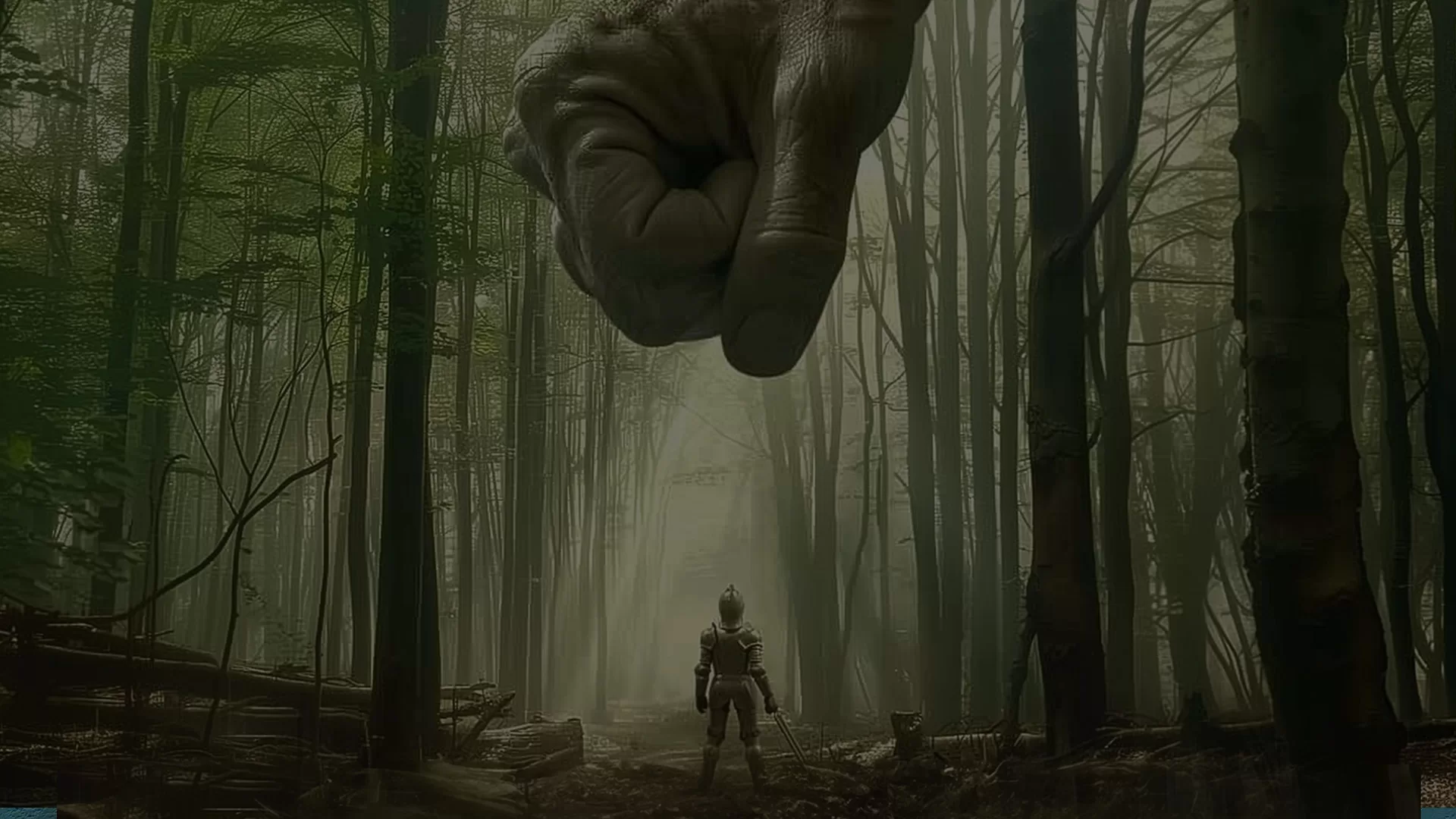What giants are you facing?
As leaders, we all face them. Those big, seemingly insurmountable obstacles we struggle to find a way around or over. No way forward. No way around. And no end in sight. We begin to question our ability to lead or to strategize. We wonder if we have the skills needed not only to face the giant obstacle but also to get beyond it. And the longer we look at that “giant,” the bigger it gets.
It may be a financial issue, a personnel challenge, or our inability to see the next step for our ministry. But the problem is big, and it seems undefeatable.
I wonder if Jesus’ disciples ever felt that way. Those twelve men heard the Lord commission them to go “into all the world” to share His Good News. Travel back then was far different from today. Yet even today, such a direction would cause most of us to see the problem as something monumental. The whole world? Us?
That’s why it must have been so comforting for those men to hear the Master say, “And be sure of this: I am with you always, even to the end of the age (Matthew 28:20 NLT).”
As a Lead Like Jesus devotional pointed out, “He gave them supernatural power to accomplish their God-given task.”
Part of the challenge with giant obstacles is their proximity to us. The closer they are, the bigger they seem. I used to ask my grandchildren, “Which is larger, this 5-cent coin or that big clock on the wall?” They would quickly say, “Daddo, the clock is much bigger.”
Then, I would take the coin and hold it close to their eye. So close that they could not see the clock. “Now, which one looks bigger?”
If we are not careful, we will allow the closeness of our giant problem to overshadow the greatness of our God. We will keep our eyes fixed on the problem and not the Master problem solver.
My Old Testament reading takes me through the days when God’s people were presented with opportunities. Yet all they could see were the problems. The classic case is when Moses appointed twelve men to scope out the land promised to them by God. They all agreed it was a wonderful land, but ten of the men were more fixed on the obstacles they saw…literal giants. Only two saw the potential of the land.
God’s people had seen miracle after miracle. They should have understood what the Lord said repeatedly: “Is there anything too hard for me?”
So, where are you fixing your gaze today? Do you focus on the giant problem before you, or do you trust the Lord? The writer of Hebrews talked of running a race, saying we need to get rid of every obstacle and every distraction that keeps us from doing our best. And then he said, “fixing our eyes on Jesus, the author and perfecter of faith… (Hebrews 12:2 NASB).
As we draw closer to our Lord, as we seek His direction and His protection, we find that the giant obstacle before us is not so big after all. It is a matter of where we fix our gaze.
God’s best,
Are you listening?
I can’t tell you how many times my wife must repeat something she has said to me. It isn’t a problem with my hearing (although my many years of radio might have had some impact). It is a problem with my listening. And it isn’t just with my wife. I find if I am not focused on listening—really listening—to someone, I will quickly forget what they said. Does anybody else relate to that?
The good news is unlike some physical hearing problems, this is correctable…with practice. Fred Smith was a mentor to top CEOs and key ministry leaders, and he had some great thoughts for leaders on listening that really hit home.
“Most people listen negatively, which is simply keeping silent or reloading while the other one is shooting. Acquiring the skills of active listening guides the talker both in the giving of facts and a display of emotion which permits the listener to evaluate on more than a surface level.”
Fred Smith also outlined some ways to develop better listening and communicating.
“Most leaders are adequate talkers, but inadequate listeners. The ability to listen creatively and positively depends on the leader’s skill development on four levels:
1) The meaning of the words. Often vocabulary is an evidence of experience, education, and background;
2) The choice of words. I have friends with impeccable word usage. They have a wide, diverse repertoire which allows them to be very specific;
3) The sounds of the words. Words are emotionally charged. We can pick up what is going on just by hearing the tone, and rhythm;
4) The sight of the words. I would say this falls into the body language category. What we say is actually seen in our bodily reactions. When we think we are not communicating, our bodies are sending messages.”
For me, the key is to focus on the person with whom you are speaking and not be distracted by others or by random thoughts. One article on active listening gave these suggestions to improve your ability to listen and not just hear:
Face the speaker and maintain eye contact.
- Be attentive and relaxed.
- Keep an open mind.
- Don’t interrupt or cut them off.
- Ask questions to clarify what they are saying.
- Give the speaker regular feedback.
- Pay attention to nonverbal cues.
A quick check of the New Living Bible translation of God’s Word shows 584 references for the word “listen.” Solomon, as he began his compendium of wisdom we call Proverbs, said:
Let the wise listen to these proverbs and become even wiser.
Let those with understanding receive guidance.
Proverbs 1:5 NLT
So… are you listening…or just hearing?
God’s best,
Are you getting older?
Sorry if that question sounds like a downer. Actually, getting older is not bad…considering the alternative!
In my nearly eight decades on this planet, I’ve come to realize there are changes as we get older. Sometimes dramatic changes. Sometimes subtle changes. But change is inevitable. I have often acknowledged that I am a lot younger from the neck up than I am from the neck down.
I recently came across some thoughts from longtime pastor, author, broadcaster, and spiritual leader David Jeremiah. Now in his eighties and still pastoring, Dr. Jeremiah has some suggestions for how to live effectively and keep going as you get older.
- Stay holy.
- Stay healthy (take care of your body).
- Stay humble.
- Stay hungry (keep learning).
Let me take these a bit out of order.
Staying healthy means taking care of your body. Yes, good eating and regular exercise are important. But what is right for those areas when you are in your thirties or forties may not be the same as when you are in your sixties and seventies. It also means not avoiding regular checkups with physicians and other medical folks. I recently told my primary care doctor it was his job to keep me on the road on my frequent international trips.
In writing to his friend Gaius, the Apostle John linked physical health to spiritual health. Both are important.
Dear friend, I hope all is well with you and that you are as healthy in body as you are strong in spirit.
3 John 1:2 NLT
Staying hungry is part of being a lifelong learner. Never stop your education. Read. Attend events that grow your understanding of today’s world. Even Google can be a source of education if used properly. Stay curious and up to date on technology and events around you. The Psalmist put high value on learning.
I believe in your commands;
now teach me good judgment and knowledge.
Psalm 119:66 NLT
Staying humble may be more challenging for some. There are people around you who will follow you and look up to you. Some will praise you and try to give you accolades and honor. Be careful how you accept these things. Remember, all that you have, know, and are comes from the Lord. It is His grace that allows you to achieve anything of worth. Paul listed humility among the important traits of God’s chosen children.
Since God chose you to be the holy people he loves, you must clothe yourselves with tenderhearted mercy, kindness, humility, gentleness, and patience.
Colossians 3:12 NLT
Staying holy. I saved this for last because it is an area that requires daily effort in my life. And it is not a suggestion. It is a command from the Lord. Simple. Straight forward. Peter underscored that for those who follow Christ.
But now you must be holy in everything you do, just as God who chose you is holy. For the Scriptures say, “You must be holy because I am holy.”
1 Peter 1:15-16 NLT
Growing older? Remember to stay holy, healthy, humble, and hungry. Then, see what the Lord will do in your life.
God’s best,
How's your heart?
A quick internet check shows me that heart disease, including heart attacks, is the number one cause of death in the United States. In fact, it is the number one cause of death worldwide. It’s a good reminder that we need to be heart healthy.
But my question has more to do with your spiritual heart. How is it? Our spiritual well-being is critical to our daily lives, just as a physically strong heart is important for our physical health. We can be strong physically but mentally and spiritually be on a downward spiral.
Each year in November the folks in the United States take time to focus on giving thanks. The fact is, being thankful ought to be a day-in, day-out experience.
Noted Methodist author and professor Donald M. Demaray once wrote on the value of giving thanks:
The magic of a thankful spirit is that it has the power to replace…
Anger with love,
Resentment with happiness,
Fear with faith,
Worry with peace,
Jealousy with joy at another’s success,
Lack of creativity with inspired productivity,
Inferiorities with dignity,
A lack of love with an abundance of self-sharing.
Over and over again, the Apostle Paul gave instructions to his friends to be thankful.
Be thankful in all circumstances, for this is God’s will for you who belong to Christ Jesus.
1 Thessalonians 5:18 NLT
And whatever you do or say, do it as a representative of the Lord Jesus, giving thanks through him to God the Father.
Colossians 3:17 NLT
Don’t worry about anything; instead, pray about everything. Tell God what you need, and thank him for all he has done.
Philippians 4:6 NLT
Eugene Peterson interpreted Paul’s admonition in everyday language:
My counsel for you is simple and straightforward: Just go ahead with what you’ve been given. You received Christ Jesus, the Master; now live him…. Now do what you’ve been taught. School’s out; quit studying the subject and start living it! And let your living spill over into thanksgiving.
Colossians 2:6-7 MSG
Thanksgiving is not a day. It is a way of life that leads to a healthy heart, a healthy life, and a healthy ministry, and brings glory to our Lord Jesus.
God’s best,
Is there an "uncomfortable" zone?
We often talk about our “comfort” zone, the place where we feel…well…comfortable. That’s not a bad thing. I want to be comfortable at home, around friends, and with our many global ministry partners. But is there a limit to our desire for comfort? Should there be an “uncomfortable” zone in our lives?
Have you ever worn shoes that were uncomfortable? I have. But that’s not what I am talking about. There are times when our comfort zone is a deep pit that keeps us from seeing what the Lord wants us to see. Often, we build the walls of that pit so high that we can’t see over our personal likes and spiritual prejudices. If you are saying “Ouch,” don’t feel too bad. Some of Jesus’ closest disciples had built up such walls, and the Lord Jesus had to reorient them to His thinking.
You probably remember the account that happened after Jesus’ death, resurrection, and ascension to heaven. The disciples were busy sharing the Good News, but in a way, they were stuck behind walls. They needed to learn the greatness of God’s heart, and it happened through Peter.
In Acts 10, we find the account of Peter on the roof of Simon the Tanner’s home. He had been there for a long time doing the Lord’s amazing work of healing lives and even raising from the dead a young lady named Tabitha. While on the roof, Peter, in a dream-like state, saw something like a sheet being lowered. It was filled with all sorts of animals, birds, and even reptiles. When the voice from heaven instructed Peter to get up, kill, and eat them, Peter went back into his comfort zone.
“Lord, I’ve never done that! Our Jewish laws have instructed me to not eat unclean things. Nope. Not doing it.”
Then the voice from heaven built a bridge from Peter’s comfort zone to God’s plan for sharing the Good News.
“Do not call something unclean if God has made it clean.”
Acts 10:15 NLT
Peter’s thoughts weren’t bad or selfish. He was doing what he thought honored God. But the Lord needed to show Peter that the Gospel had a broader path, and it included the Gentiles.
I’m so glad Peter was willing to move out of his comfort zone to share the hope of Christ with that Roman soldier Cornelius. It opened the door for you and me to know the joy of salvation through Jesus Christ.
In my global travels, I have been confronted with things that are beyond my personal preferences and biblical understanding. I must be reminded that God’s ways are not necessarily my ways. I have had to hear that voice that said, “Don’t call something unclean that God has called clean.” And I have had to adjust my understanding to the Lord’s heart for the world.
There are certain things I won’t adjust —the main tenets of our faith. But there are other practices and areas that are okay spiritually, even if they are different from what I have always known or thought.
So, how do you discern these things? I’m glad you asked! Prayer. The daily study of God’s Word. An openness to the Holy Spirit’s instruction that may take me out of my comfort zone…but place me where the Lord can do amazing things in the lives of others. I’m willing to be uncomfortable if it furthers the work and the spread of God’s Good News to a lost an dying world.
God’s best,
Are you boring?
We live in a communication world. We have never been more connected, yet we often struggle with being understood, being clear, being relevant, or being influential with the greatest message ever proclaimed. Is the message of Christ out of step with our culture? Do we need to change it? Or do we need to better understand the communication process in today’s busy world?
My university teaching has typically been on a topic that most college students think is out of date. Radio. Yet by the end of the semester, they have come to realize why radio continues to have a powerful role in our culture today. Sure, we don’t sit around the radio as a family in the evening listening to radio dramas. New technologies and our modern-day lifestyles have shifted the way we use radio. The students also discover that many of the principles for effective radio have a broader application, encompassing the communication process in general.
Radio specialist Valerie Geller lays out many of these principles in her book Beyond Powerful Radio. Here are a few of the points Valerie uses as she consults with clients around the world:
- Tell the truth.
- Make it matter.
- Never be boring.
- Speak visually, in terms your audience can “picture.”
- Address the individual as “you.” Talk to one person at a time.
- Be who you are.
- Take risks
- Dare to be great.
Number two is critical. When we share spiritual truth, we need to be sure the audience knows it is important. It matters. For radio particularly, number five is important. The use of “you” in your conversation and the understanding of the intimate medium of radio will link you in amazing ways to the listener.
I especially like number eight. When our purpose is right and our message is based on God’s Truth, we can and should aim for excellence in our presentation. There is no good reason to be second best in presenting biblical truth. We should strive to be the best communicators around.
As I mentioned earlier, many of these principles and suggestions will also help us in our day-to-day communications. Speaking visually is important, using language that paints pictures for the listener to “see.” Think of the stories of the Bible, the stories and parables that Jesus told. We can often pull up visual images that help enhance the stories and make them memorable. I can see in my mind the rather small man named Zacchaeus as he climbed up in a nearby tree to get above the crowd with hopes of seeing Jesus as he passed by. Even without the help of Hollywood movies, I can see the agony of Christ on the cross. If I say “Noah,” do you see his ark?
The stories of the Bible are not boring. And neither should we be boring as we share the greatest story mankind has ever heard… that the God who hung the stars in place sent His son to be born as a baby in a smelly animal stall. Jesus’ life would impact all those around Him, and then He would die by the cruelest of all methods of punishment ever devised…the cross. We can picture Him there. And we see the rock tomb where Jesus was buried, with its big stone blocking the entryway. Such a powerful, visual story.
Let’s sharpen our communication skills. Someone today needs to hear the most important news in our world. And you are the one who may need to deliver it.
God’s best,
That pesky law of Newton’s!
You probably learned it in high school.
Objects in motion tend to stay in motion.
Objects at rest tend to stay at rest.
The second part of Newton’s Law of Motion is the pesky one for me. When I’m in a warm bed on a cold day, I “tend” to stay at rest…under the covers. When I’m taking a hot shower, the hard thing is turning off the soothing water. I “tend” to want to just stay there, enjoying the warmth.
Guess what? This law also applies to us in leadership. We can easily get stuck at rest, in our comfort zone, tending to stay there when we should be moving forward. We are “warm and safe” there. No risk. No issue with failure.
“A ship is always safe at shore, but that is not what it’s built for.”
I love that quote, which has been attributed to many, from author John A. Shedd to Albert Einstein to Navy admirals. It speaks to us on several levels.
It is easy to stay in our comfort zone to avoid facing challenges and the potential for failure. But little is accomplished by staying in our safe harbor. Someone has said, “While staying in our comfort zones might be safe and easy, it prevents us from fulfilling our true potential and purpose, which often requires taking risks and facing challenges.”
God gives us a strong nudge to step out and fulfill our purpose. James’ words are a call to action, not safety:
But don’t just listen to God’s word. You must do what it says. Otherwise, you are only fooling yourselves.
James 1:22 NLT
When we get comfortable, we begin to fool ourselves. We become content with where we are and don’t want to push out for fear of storms, challenges, or even failure. God calls us to be better than that.
We should embrace the great potential for growth and success that lies beyond the comfort zone. Set sail, face the challenges and opportunities, and know the Lord is with you as you step out. Above all, don’t allow Newton’s law to keep you from fulfilling God’s assignment for you and those you lead. Don’t stay at rest in your comfort zone. That’s not what you were designed to do.
God’s best,
Talk is cheap!
There is probably a comparable saying in many countries to what we say in the U.S…. “Talk is cheap!” That phrase can take on meaning at various levels. It may mean that it is easy to say something, hard to do it, or live it. It could mean that “much speaking” is not necessarily a virtue. And while we are communicators, we need to choose our words carefully.
Valerie Geller travels the world teaching communication principles to broadcasters. Her book Beyond Powerful Radio has become a classic and contains wisdom for all in the media field. In fact, the subtitle of that book is A Communicator’s Guide to the Internet Age. I have drawn wisdom from it for courses and seminars I have taught over the years.
In a section called Avoid Useless Chatter, Geller says, “Just because you can say something doesn’t mean you should.” This applies no matter what medium you are using: radio, television, or social media. Wow. Half or more of Facebook might disappear if people took this to heart—my posts included!
Valerie Geller also quotes air personality Turi Ryder, who says, “Think of all the available content as crude oil. There may be a lot of it, but it’s no good to you unless it’s refined.” One of your roles as a communicator is to take raw material and refine it for the audience. Your role is not to just replicate what you hear or read. Many have been caught on the internet passing on “fake news” because it sounded good, only to (hopefully) retract it when the false story was discovered.
Our communications need focus. We need to know our topic and the point we are trying to make. We need to be aware of the “brand” we are building. People associate what they see, hear, and experience with a person, a station, a blog, or even a product. Most of us have been disappointed when we purchased a consumer item based on the brand and discovered the brand had produced a low-cost, inferior product. Just because they could do that, should they have done it? Not if it costs them their reputation.
The Bible even addresses this topic. Solomon was pretty direct in his writings in the Old Testament book of Ecclesiastes:
...too many words make you a fool.
Ecclesiastes 5:3 NLT
Sometimes, we can improve our communication process by simply finding the “off-ramp.” We may make a solid point, then continue to ramble on, with the result that the good point is lost in our many words. Use your words carefully and communicate truth in a clear and powerful way. That has the greatest impact on your audience.
God’s best…
He maketh me to lie down...
Many of us learned the 23rd Psalm in the King James language. Sometimes, the antiquated words and form get in the way of the passage’s meaning. But other times, there is a lyrical quality that enhances and underscores the beauty and power of the psalm in deep ways.
“He maketh me to lie down in green pastures.” That gives a different emphasis than the New Living Translation’s “He lets me rest in green meadows.” Sometimes, for our good, the Lord “maketh” us to lie down.
This came to my mind recently after returning from my second international trip in about three weeks. I was worn out and dealing with a pesky cough. The only remedy I had was to stay down for a few days. I needed to be refreshed. To be honest, that is not my nature. There is always something more to do, some planning and preparation, some writing, some something on my agenda. But God has something else for me than just “doing.” Scripture reminds us, “…times of refreshment will come from the presence of the Lord, and he will again send you Jesus, your appointed Messiah (Acts 19:20 NLT).”
He maketh me to lie down…
The Old Testament makes a big deal of the Sabbath day of rest. The Lord went so far as to tell His people to give the land a time of rest, to be renourished and replenished. Is there a lesson for us in that? God has admonished us to “Be still and know that I am God (Psalm 46:10 NLT).”
From my recent experience, God has given me some new insights and vision for ministry. The Lord has reminded me of the nature of our world and the deep need for us to do as Peter says, to “…set Christ apart as Lord in your hearts and always be ready to give an answer to anyone who asks about the hope you possess (1 Peter 3:15 NET).”
I am reminded that along with the global opportunities we have to reach the unreached who have never heard the Gospel, we need to be aware of those right around us. Family, friends, the waiter at the restaurant, and the person on the airplane next to us. Be ready.
For me, it starts with refreshment. Rest. I should do that on my own before the Lord “maketh” me do it. But I also need to recognize that God is doing this for my good. And…for His great purpose.
God’s best,
Light..or life?
There was an old hymn we used to sing:
The whole world was lost in the darkness of sin.
The Light of the world is Jesus.
I don’t hear it much these days. Yet the message is as true today…maybe more so…than when I was young singing those words.
As I travel to various places in our world, as I look across the spiritual landscape, it is quite obvious that our world is in darkness and needs a great light. The Light of the world.
Yet most in darkness don’t see the light. They often aren’t aware they need the light. Oh, yes, many know that something is not right in their world, or more specifically, in their lives. But they don’t know what to do. Where to turn.
That’s why Jesus… the Light of the world…said to His followers:
You are the light of the world….
Matthew 5:14 NLT
The Lord went on to say that our light should shine into the darkness in a way that points others to Him, that glorifies our Heavenly Father.
Henry Blackaby in his book Experiencing God Day by Day wrote:
“There is no mistaking the effect of light upon a darkened place. Light boldly and unabashedly announces its presence and vigorously dispels darkness.”
Can I expand that just a bit? It is one thing to carry the light, to shine the light, to hold up a spiritual mirror and reflect the light. It is another thing to live the light. Today, I would say we need to hear, “Let your life so shine before men that they see Jesus and glorify our Heavenly Father. I can tell others what God’s Word says. Far better if my life also shows others that we are living and walking in that light personally.
Blackaby went further in his writing:
“God’s desire is to fill you with His light. He wants you to shine as a brilliant testimony of His presence and power in your life, so that the darkness in the lives of those around you will be displaced by the light of God’s glory. Can that be said of you as well? Do your coworkers recognize the light that is within you? Does the presence of Christ radiate from your home into your community? When God’s light is allowed to shine unhindered through your life, the darkness around you will be dispelled.”
There are many around you who need light. Their life is filled with darkness. Some of it is of their own making. Others live in circumstances where there is no light, no hope. They need to catch a glimpse of the hope in your life, and they will be drawn to that ultimate Light.
James wrote his letter to believers scattered abroad. They had a great opportunity to make an impact for Christ and the Gospel, but James had a word of warning for them:
But don’t just listen to God’s word. You must do what it says. Otherwise, you are only fooling yourselves.
James 1:22 NLT
So… today…let your LIFE shine before those around you so that they will see Jesus.
God’s best,














